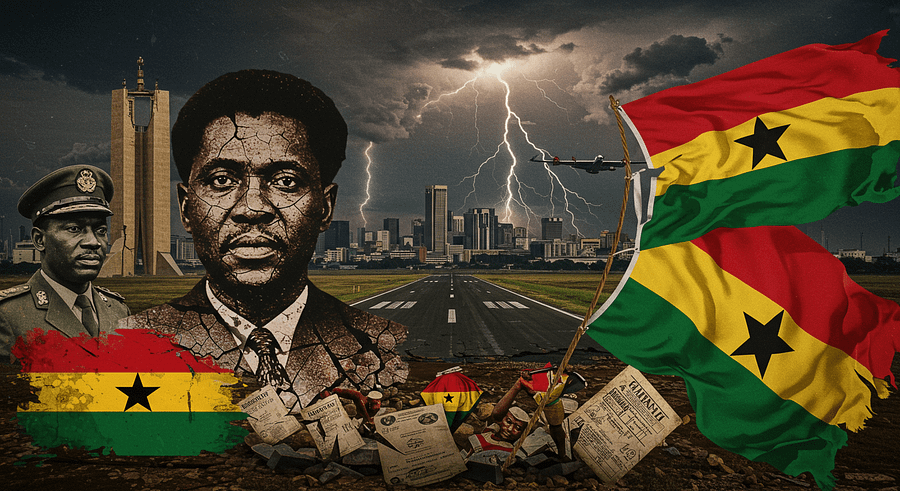
Ghana’s story blends pride with betrayal, a history of resilience shadowed by moments of upheaval. Since February 24, 1966, when Kwame Nkrumah, the nation’s first president, was ousted in a coup that ended the First Republic, a pattern of power grabs has marked the country. These events—some successful, others stopped short—have disrupted Ghana’s peace and left a deep, unhealed wound in its people’s minds, a pain lingering nearly 60 years later. This article uncovers five lesser-known chapters from Ghana’s coup-filled past, revealing the figures behind the chaos and the lasting toll on the nation. One truth stands clear: those who seize power through betrayal often trade Ghana’s future for their own gain.
1. The CIA’s Role in 1966: A Hidden Hand
The 1966 coup wasn’t just a military uprising—it had foreign backing few discuss. Declassified U.S. documents from 1999, released by the State Department’s Office of the Historian, show the Central Intelligence Agency (CIA) knew of and supported the plot to remove Nkrumah. His socialist policies and resistance to Western influence had made him a target. A March 12, 1966, memo from Robert Komer to President Lyndon B. Johnson calls the coup a “fortuitous windfall,” noting Nkrumah’s threat to U.S. interests. CIA station chief Howard Bane in Accra worked closely with discontented officers, providing resources and intelligence.
John Stockwell, a former CIA officer, wrote in his 1978 book In Search of Enemies that Bane “engineered the overthrow” discreetly—no direct orders tied the agency to it, but Bane earned promotions and an Intelligence Star. The CIA even helped seize Soviet equipment during the chaos. This outside meddling stopped Nkrumah’s push to build 68 state factories, from shoes to steel, and set Ghana on a rocky path. It’s a bitter pill: a nation’s ambitions were undermined by hidden players abroad.
2. Operation Guitar Boy’s Quiet Ban
On April 17, 1967, junior officers tried to overthrow the National Liberation Council (NLC) in a failed coup called “Operation Guitar Boy.” Lieutenants Samuel Arthur and Moses Yeboah killed Colonel E.K. Kotoka, a 1966 coup leader, but their plan collapsed. Executed soon after, their brief rebellion left an odd mark: the NLC banned Victor Uwaifo’s song “Guitar Boy” from Ghanaian radio. The title matched the coup’s codename, and leaders feared it might stir trouble. This small act shows a government uneasy with its hold, silencing a song to keep control. The betrayal cuts deep—soldiers once loyal to Kotoka turned against him, a sign of the distrust born in 1966.
3. Acheampong’s 1972 Promise: Hope to Hardship
On January 13, 1972, Lt. Colonel Ignatius Kutu Acheampong led a smooth coup against Prime Minister Kofi Busia’s government, forming the National Redemption Council (NRC). With the economy struggling after a currency devaluation, Acheampong won early support by rejecting Ghana’s foreign debts, declaring “Yentua” (We Won’t Pay). People cheered this bold move, but it didn’t last. By 1975, his NRC became the Supreme Military Council (SMC), ruling with strict measures and curfews. The Second Republic faded, and promises of relief turned to tighter grip. It’s a familiar sting: a leader rode public frustration to power, only to betray that trust with more control.
4. Rawlings’ Rise: From Setback to Symbol
On May 15, 1979, Flt. Lt. Jerry Rawlings attempted a coup against the SMC and failed, landing in jail. His arrest sparked a mutiny that freed him, leading to the Armed Forces Revolutionary Council’s (AFRC) success on June 4. Rawlings’ early stumble made him a hero—his attacks on corruption and privilege spoke to a tired nation. The AFRC’s harsh “housecleaning” saw eight senior officers, including Acheampong and Fred Akuffo, executed, shocking Ghana but boosting Rawlings’ image. Here’s the twist: a failed rebel became a savior, yet his methods echoed the harshness he opposed. His 1981 coup deepened this cycle, leaving more scars.
5. The Doctor’s 2019 Plot: A New Threat
Even in Ghana’s democratic years, unrest simmers. On September 20, 2019, police arrested three civilians, including Dr. Frederick Yao Mac-Palm, and soldiers planning to destabilize President Nana Akufo-Addo’s government. From a hospital, they made homemade weapons, targeting the presidency. In 2024, six received death sentences for treason. This strange, civilian-led plot shows the past isn’t buried—echoes of 1966’s turmoil still surface, challenging Ghana’s calm. It’s a jolt: betrayal can come from unexpected places, even now.
The Lasting Pain: A Nation Unhealed
These stories aren’t just history—they’ve shaped a heavy burden. The 1966 coup didn’t only end Nkrumah’s rule; it started a wave of fear, loss, and doubt that still lingers. Later coups—1972, 1979, 1981—and failed tries like 1967, 1979, and unlisted 1982-83 attempts piled on the strain, a steady rhythm of curfews, killings, and economic dips. About 1,600 died in 1966 alone, and families mourned without closure. Trust broke as soldiers turned on leaders, civilians on democracy. Money troubles—from lost industries to Acheampong’s debt stance and 1980s cuts—left people feeling stuck, their hopes dimmed.
This isn’t just a mark—it’s a daze, a kind of national post-traumatic stress disorder never addressed. The anger grows because 1966’s betrayal opened the door to more, each event a new hurt on an old wound. Kids of that era passed fear to their own, who now live wary of power. Ghanaians hold on through faith, humor, and community, but beneath it lies a quiet pain, a fog slowing the nation’s stride.
A Call to Stay Awake
Ghana’s list of coups— incomplete, with many failed plots lost to time—asks for more than memory. It calls for alertness. The CIA’s 1966 role, the 1967 song ban, Acheampong’s 1972 shift, Rawlings’ rise, and 2019’s odd scheme all point to one lesson: betrayal thrives when watchfulness fades. Ghana must wake up, stay super alert, and reject those who grab power for themselves. This isn’t only about Nkrumah or past losses—it’s about taking back a future stolen by deceit. Let the frustration push action, the pain build strength. Ghana, and Africa, must keep watch, or history’s betrayers will return
